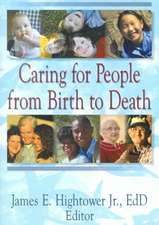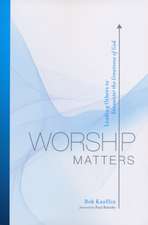Training Guide for Visiting the Sick: More Than a Social Call
Autor Richard L. Dayringer, William G. Justiceen Limba Engleză Paperback – 28 sep 2005
Training Guide for Visiting the Sick: More Than a Social Call is a useful handbook from a Christian perspective that provides the common sense and not-so-common answers to your questions on how best to minister to the sick. Drawing on his three decades of experience as a bedside hospital chaplain, the author explains appropriate and inappropriate behaviors and suggests things to say (or not to say) to truly make your next visit fruitful for you and the patient. More than simply an educational tool, this guidebook provides clergy and Christian laypeople with spiritual explanations and straightforward strategies to not only comfort the patient but also foster the sense of joy and accomplishment in oneself.
Training Guide for Visiting the Sick: More Than a Social Call teaches you to glean a positive experience from a difficult task, the visit to the sick. The author shares his insights learned in his lengthy and distinguished career in this instructional guidebook. Honest and compassionate in its portrayal of the sick and dying, the book prepares the reader spiritually, emotionally, and even physically for the challenge of the visit while focusing on the distress and the needs of the patient. At times stating practical common sense, other times shining an insightful light on the less physical aspects of the visit, this educational handbook is invaluable for all who minister, or wish to minister, to the sick.
Training Guide for Visiting the Sick: More Than a Social Call discusses:
- Jesus’ Eleventh Commandment—To Love One Another
- how to prepare yourself spiritually and emotionally for the visit
- the hospital patient’s world
- explanations of patients’ possible emotional, financial, family, and spiritual distress
- do’s and don’ts to note before and during a visit to the patient’s room
- the special needs of shut-ins
- ministering to the dying
- ministering to difficult patients
- ministering to Alzheimer’s or comatose patients
| Toate formatele și edițiile | Preț | Express |
|---|---|---|
| Paperback (1) | 139.31 lei 6-8 săpt. | |
| Taylor & Francis – 28 sep 2005 | 139.31 lei 6-8 săpt. | |
| Hardback (1) | 312.57 lei 6-8 săpt. | |
| Taylor & Francis – 7 oct 2005 | 312.57 lei 6-8 săpt. |
Preț: 139.31 lei
Preț vechi: 189.61 lei
-27% Nou
Puncte Express: 209
Preț estimativ în valută:
26.66€ • 27.76$ • 22.53£
26.66€ • 27.76$ • 22.53£
Carte tipărită la comandă
Livrare economică 10-24 martie
Preluare comenzi: 021 569.72.76
Specificații
ISBN-13: 9780789027047
ISBN-10: 0789027046
Pagini: 160
Dimensiuni: 148 x 210 x 11 mm
Greutate: 0.3 kg
Ediția:1
Editura: Taylor & Francis
Colecția Routledge
Locul publicării:Oxford, United Kingdom
ISBN-10: 0789027046
Pagini: 160
Dimensiuni: 148 x 210 x 11 mm
Greutate: 0.3 kg
Ediția:1
Editura: Taylor & Francis
Colecția Routledge
Locul publicării:Oxford, United Kingdom
Cuprins
- Foreword (Richard Dayringer)
- Preface and Acknowledgments
- Chapter 1. Ministry As a Response to the Eleventh Commandment
- A New Commandment
- The Great Commission
- Chapter 2. The Prepared Serve Well
- Prepare Yourself Spiritually
- Prepare Yourself Emotionally
- Prepare by Answering Some Questions of Yourself
- Prepare by Learning
- Prepare to Listen
- Prepare for a Test
- Prepare by Learning the Patient’s Likes and Dislikes
- Preparation Yields Proven Benefits
- Chapter 3. The Hospital Patient’s World
- An Ancient Alien World of Distress
- A Modern Alien World of Distress
- Chapter 4. Dos and Don’ts Before Entering the Patient’s Room
- Planning Your Visit
- Respect the Rules of the Hospital
- Respect the Privacy of the Patient
- Chapter 5. Dos and Don’ts While Visiting in the Patient’s Room
- Entering the Patient’s Room
- Greeting and Initiating the Visit
- Maximizing the Effects of Your Physical Presence
- Monitoring Your Mood, Attitude, and Conversation
- Ending Your Visit
- Final Thoughts
- Chapter 6. Shut-Ins: The Church’s Abandoned People
- Nursing Home and Assisted Living Facility Patients
- Homebound Patients
- Planning the Time and Length of Your Visit
- Structuring Your Visit and Making the Most of Your Time
- Understanding and Respecting the Staff’s Concerns and Requests
- Chapter 7. Ministering to the Dying
- Our Conflicts with Death and Dying
- Some Factors That Influence the Dying Patient’s Coping Process
- Goals While Working with the Dying
- Should the Patient Be Told That He or She Is Nearing Death?
- What Can We Expect of the Person Who Learns That He or She Is Soon Going to Die?
- Deathbed Repentances
- Trust in Yourself and Your Resources
- Advice for Pastors and Professional Hospital Chaplains
- Chapter 8. Ministering to Other Difficult Patients
- Ministering to the Comatose Patient
- Ministering to the Alzheimer’s Patient
- Chapter 9. Conclusion
- References
- Index
Notă biografică
Dayringer, Richard L; Justice, William G
Descriere
Training Guide for Visiting the Sick: More Than a Social Call is a useful handbook from a Christian perspective that provides the common sense and not-so-common answers to your questions on how best to minister to the sick. Drawing on his three decades of experience as a bedside hospital chaplain, the author explains appropriate and inappropriate behaviors and suggests things to say (or not to say) to truly make your next visit fruitful for you and the patient. More than simply an educational tool, this guidebook provides clergy and Christian laypeople with spiritual explanations and straightforward strategies to not only comfort the patient but also foster the sense of joy and accomplishment in oneself.










